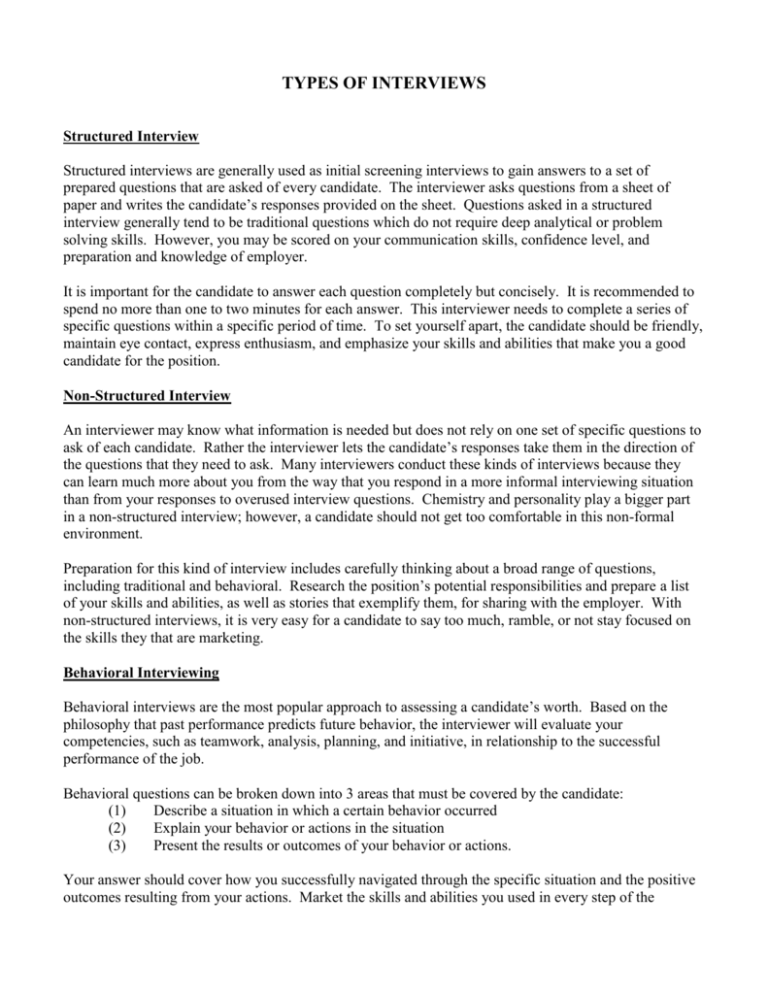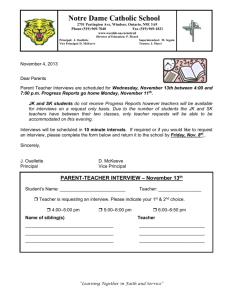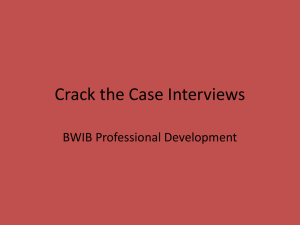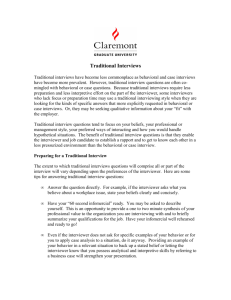types of interviews - MercerProfessional.org
advertisement

TYPES OF INTERVIEWS Structured Interview Structured interviews are generally used as initial screening interviews to gain answers to a set of prepared questions that are asked of every candidate. The interviewer asks questions from a sheet of paper and writes the candidate’s responses provided on the sheet. Questions asked in a structured interview generally tend to be traditional questions which do not require deep analytical or problem solving skills. However, you may be scored on your communication skills, confidence level, and preparation and knowledge of employer. It is important for the candidate to answer each question completely but concisely. It is recommended to spend no more than one to two minutes for each answer. This interviewer needs to complete a series of specific questions within a specific period of time. To set yourself apart, the candidate should be friendly, maintain eye contact, express enthusiasm, and emphasize your skills and abilities that make you a good candidate for the position. Non-Structured Interview An interviewer may know what information is needed but does not rely on one set of specific questions to ask of each candidate. Rather the interviewer lets the candidate’s responses take them in the direction of the questions that they need to ask. Many interviewers conduct these kinds of interviews because they can learn much more about you from the way that you respond in a more informal interviewing situation than from your responses to overused interview questions. Chemistry and personality play a bigger part in a non-structured interview; however, a candidate should not get too comfortable in this non-formal environment. Preparation for this kind of interview includes carefully thinking about a broad range of questions, including traditional and behavioral. Research the position’s potential responsibilities and prepare a list of your skills and abilities, as well as stories that exemplify them, for sharing with the employer. With non-structured interviews, it is very easy for a candidate to say too much, ramble, or not stay focused on the skills they that are marketing. Behavioral Interviewing Behavioral interviews are the most popular approach to assessing a candidate’s worth. Based on the philosophy that past performance predicts future behavior, the interviewer will evaluate your competencies, such as teamwork, analysis, planning, and initiative, in relationship to the successful performance of the job. Behavioral questions can be broken down into 3 areas that must be covered by the candidate: (1) Describe a situation in which a certain behavior occurred (2) Explain your behavior or actions in the situation (3) Present the results or outcomes of your behavior or actions. Your answer should cover how you successfully navigated through the specific situation and the positive outcomes resulting from your actions. Market the skills and abilities you used in every step of the situation. Prior to the interview, evaluate the job description to identify which skills and abilities will be important in the new position, and focus your response to the behavioral questions around the skills and abilities that are important to the employer for the specific job for which you are interviewing. Stress Interview Stress interviews often involve offensive or illegal questions that are designed to deliberately make you uncomfortable. A stressful interview can be the first interview or the last in a succession of interviews. The questions are asked to test your poise, to see how you react to pressure, and to strike at your confidence. Do not consider the questions as personal insults, but rather challenges and opportunities to shine. Preparedness is the best defense for a stress interview. Develop answers to reflect your experience, skills and abilities. Techniques used by interviewers include: A series of easy questions to relax your guard and then a series of very direct, pointed questions, such as “Tell me what sort of troubles you have with your boss?” An interviewer who asks you to tell him/her about yourself and then sits and stares at you after you’ve answered. A simple yes/no question turns into a questions related to who, what, when, how, and where. A panel of interviewers shoot questions at the candidate all at once. Illegal questions related to sex, age, race, national origin, or religion Case or Consulting Interview Case or Consulting interviews are centered on your analytical abilities rather than specific information of the individual. While some of the questions may be based upon your resume, or behavioral in nature, the majority of the consulting interview will be centered on “case questions” based on a problem to be solved. The structure of this type of interview helps the interviewer sort through candidates and determine which ones have the best analytical abilities under stress. No matter what your answers are, your presentation skills are also being judged. WetFeet.com classifies case or consulting questions into five categories: (1) Market-Sizing – determine the size of a particular market What is the market for the traceable golf ball in the United States? (2) Brainteaser How many trees are there in the metro area of Atlanta, GA? (2) Business Strategy Questions – can have a market-sizing piece, a logic puzzle, multiple operations issues, and require creativity and action How do you decide when it is time to pull a product off the market? (3) Business Operations Questions – usually have lots of potential answers What factors need to be considered when considering outsourcing a particular business operation? (4) Other Questions Psychological Interviewing The purpose of psychological interviews is twofold: (1) to determine whether the candidate is honest and tries to do his/her work well; and (2) to identify what type of assignment and management style would the candidate respond to successfully. Questions generally focus on the candidate’s aspirations and family background in order to uncover links between the two. Other questions might relate to the candidate’s experiences that provided the greatest satisfaction or situations that they want to avoid Keys for candidates include: Relax and be yourself Tell the truth but don’t give too much information unless probed further Work questions get work related answers in a confident manner Avoid deception, inconsistencies, nervousness, or anxiety in your answers Outlandish questions should be answered conservatively, i.e. “If you were a tree, what kind would it be? Potential answers should be “oak” (stable), “maple” (well-liked), or “redwood” (long lasting). KINDS OF INTERVIEWS Below are listed some kinds of interviews that are different than face-to-face interviews. With the cost of travel ever increasing, employers may use one or more of the kinds of interviews below for screening or first interviews with candidates. Telephone Interviews Telephone interviews are generally used as a method of initial screening, but don’t be surprised if you have a telephone interview in the third or fourth interview. The majority of companies will inform you in advance and usually pre-arrange a time with you. However, when you are in a job hunt always answer your telephone professionally and in a courteous manner. You never know when you are giving a first impression over the telephone to an employer. Important points to remember about telephone interviews are: To make a good first impression over the telephone. While an employer cannot read your body language in a telephone interview, personality and enthusiasm do come through your tone of voice. To be aware of how you sound over the telephone. Practice on the telephone with a friend, Career Services professional, or by taping your answers on a tape recorder. Call your telephone number and leave your 1-2 minute commercial on your voice mail. When you play it back, you will get a better idea of what the employer will hear. To make sure you allow enough time for the telephone interview. Interviews can take up to an hour. Never put an employer on hold for you to answer another call when you are interviewing. To be prepared. You can have the job description, your research papers and notes, along with pen and paper with which you can take notes, in front of you during a telephone interview. Be careful not to make a lot of noise moving your papers about as this will be distracting to the employer on the other end of the telephone. To listen carefully for the introduction by the employer so that you can get his/her correct name and then use the name during the course of the conversation. To ask about the next step in the interview process at the end of the conversation. Have your calendar ready to schedule that next face-to-face interview with the employer. Video Interviews Large companies who recruit around the world may use video interviews as a means of an initial screening. You should treat these as traditional interviews; Dress professional as you would for a face-to-face interview. Address your answers to the interviewer, i.e. the camera rather than the display screen. Listen carefully to the questions and instructions, asking the interviewer to repeat anything that you don’t understand. Sequential Interviews Sequential interviews are when you have interviews with several different people on the same day. Usually each interviewer will ask questions to test different sets of competencies. However, you may find yourself answering the same question over and over. The challenge in sequential interviewing is to stay fresh; answer each question, whether it’s the same or not, as completely as possible staying on message emphasizing your skills and abilities. If you are moving from office to office, look around to see if you can connect with the interviewer relating to something you see in his/her office. Treat each new interviewer as if he/she was the first interview of the day. In this case, you are not just making a first impression with one interviewer, but with every one you meet. Panel Interviews In this type of interview you are questioned by several people sitting around a table. This type of interview allows all pertinent employees to meet the candidate at one time. Often times more stressful than a one-on-one interview, answer each question as completely and professionally as possible. Initially address your answer to the person who asked it, but move your eyes around the table to other panelists to make a personal connection with them also. RESOURCES: (located in the Office of Career Services-Atlanta) 101 Smart Questions Tto Ask On Your Interview, Ron Fry Best Answers to the 201 Most Frequently Asked Interview Questions, Matthew J. DeLuca Hiring the Best, A Manager’s Guide to Effective Interviewing, Martin Yate How to Interview Like A Top MBA, Dr. Shel Leanne Interviewing, 3rd ed., Arlene S. Hirsch, National Business Employment Weekly Killer Interviews, Frederick W. Ball and Barbara B. Ball Knock ‘em Dead 2001, Martin Yate The Interview Rehearsal Book, 7 Steps to Job-Winning Interviews using Acting Skills You Never Knew You Had, Deb Gottesmann and Buzz Mauro Vault Guide to Finance Interviews, D. Bhatawedekhar and the Staff of Vault







